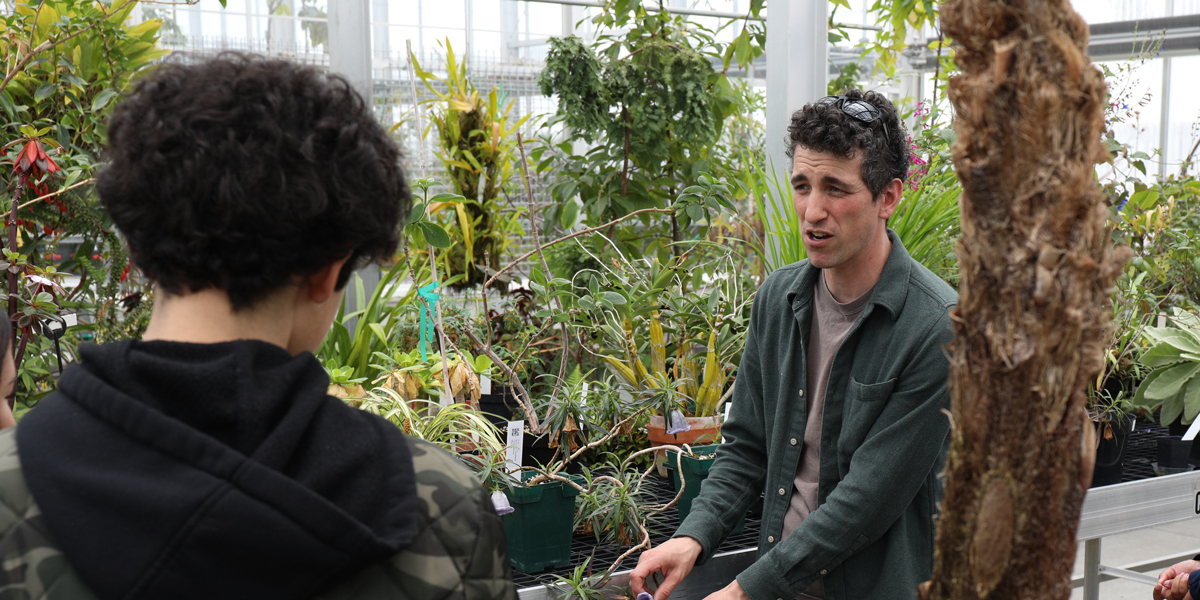
CBS Conservatory & Botanical Collection Curator Jared Rubinstein showing students plants in the conservatory as part of their time on campus.
Envisioning the future often requires an understanding of what’s possible. Whether it’s pursuing a career path, moving to a new city or planning out a vacation, changes in life force you to think about where you’ve been and where you’re going. But what happens when there are opportunities in the world that you don’t fully grasp? The BMBB Diversity, Equity and Inclusion committee hopes to help current K-12 students bridge that exact gap.
For the past three years, the BMBB DEI committee has welcomed students from local middle and high schools to campus to help them spark an interest in the biological sciences and consider pursuing the sciences in their education and careers. This spring, the committee hosted students from Washington Tech High School, engaging with them in lab activities, showing them around the CBS Conservatory & Botanical Collection and sharing a bit about what life is like as a scientist.
We recently caught up with Edgardo Sánchez Rivas, a BMBB graduate student, and Santiago Martinez Cifuentes, a BMBB staff member, who helped lead these student groups on campus to get their thoughts on the day.
Why did you want to get engaged with these BMBB DEI events in particular? What stands out to you about this experience?
Sanchez-Rivas: I have always been motivated to teach and illustrate to younger generations what it is to be a scientist. As I come from an underrepresented background, I know the difficulties of finding the opportunities to know what I could do with my future. These types of activities where we show middle schoolers what is the fun, the purpose and possibilities of science inspire me to be a lighthouse for those who have considered science their passion but haven't seen which is the road to travel. What stands out for me in these experiences is how we can engage the inner child, the innate curiosity, and allow them to explore their own questions of the world.
Cifuentes: I want students to think of science as something fun, something that happens and they do every day without noticing and a very interesting and fun career path, not this "hard, annoying subject I struggled with in middle/high school." Also, I think this kind of engagement is important because I want to make science a career available for everyone regardless of who you are or where you are from (geographically or socioeconomically).
What do you hope students get out of their time meeting with you at school, as well as their time on campus?
Sanchez-Rivas: I hope that the students get a sense that the road to science is not a straight line, there is no perfect path, and there is a spectrum of what a scientist could do. With the visit of graduate students to the school, we hope for them to feel comfortable in their spaces to learn a little bit about us and allow them to take on some science experiments in the area of Biochemistry. However, with them visiting our campus, in my point of view, the purpose is greater. Not only do they explore a great university well equipped to do awesome science, but to show them that we are accessible people. We need to close the gap between the perception of what is a scientist and a normal human being.
What's unique about bringing students to campus, as opposed to working with them where they're at?
Cifuentes: They get to see the labs(!), interact with real scientists and get a glimpse of "how the sausage is made". I think it helps challenge some of the stereotypes that surround scientists and research laboratories that they may see on movies and TV. It also allows us to show them more awesome things that we would not be able to bring to their classroom. That plus pizza and meeting Goldy the Gopher and you have a unique experience right there!